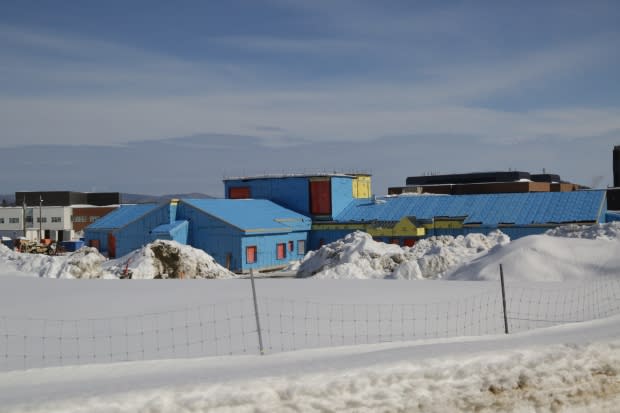North-south tension rises as leaders fear losing troubled youth mental health centre
The damning report into the crisis of care at the provincial psychiatric hospital in Campbellton has thrown the future of the near-complete youth annex in doubt as calls mount to move the centre south.
New Brunswick ombud Charles Murray's report, released Feb. 7, described significant mistreatment and inadequate care at the Restigouche Hospital Centre and recommended cancelling the youth mental health project.
In the following weeks, a chorus of voices, from MLAs of different stripes to non-profit groups and the former child and youth advocate, have supported the idea.
The north is so forgotten, from transportation, the conditions of our roads, the plowing of our roads, to government offices coming here. We're losing them to the south. - Randy Hunter, Tide Head mayor
But municipal leaders in northern New Brunswick are pushing back against what they see as another instance in which health-care services, or other government services or programs, are centralized within the "golden triangle" in the south.
"It's not easy when you get a report such as the one on the Restigouche Hospital Centre," said Atholville Mayor Michel Soucy.
"It's not easy to digest because you feel attacked, because we've seen, almost, the north and south division, the French and English division. We don't need that."
Construction inside the youth annex was halted two weeks ago. Work on the exterior will continue, according to Alysha Elliott, a Health Department spokesperson, but the annex won't be completed "until a final decision is made with respect to the future of the Centre of Excellence for youth."
The provincial government has hired George Weber, a mental health care consultant, to review the facility and Murray's report.

The province "reacted to the situation and now we will see the results of the investigation, or inquest, by Mr. Webber," said Soucy.
But he said the government shouldn't be hasty in its decision and must consider all other opportunities before opting to relocate.
"Yes, there is a problem," said Soucy.
"But now, let's look at the report and see what we can do to improve the situation at the Restigouche Hospital.
"The easy solution might be to move away, but "let's work with what we have here and how we can improve it."
'Ongoing safety risk'
Murray's report said there is an "ongoing safety risk to both patients and staff" at the $156-million centre that opened in 2015, replacing the hospital that was built decades earlier.
The report described how a patient died of an infection after not having their vital signs monitored closely and another case about an employee that like to torment patients.

Murray said the chronic understaffing is at the root of the failure to protect patients. He said "sincere attempts" to improve service delivery did not succeed.
Vitalité Health Network disputed some of the report's findings, describing them as outdated. CEO Gilles Lanteigne said steps were taken to improve the culture in the centre, and he maintained patients are safe.
Dr. France Desrosiers, Vitalité's vice-president of medical services, said staff shortages are a fact throughout the health-care system and it's "not a workforce issue" but "a culture issue."
'Time to stand up for our staff'
The situation has inflamed the longstanding tension between the north, where the economy has sputtered and unemployment remains high, and the richer, more populated south.
It's an argument the mayor of Campbellton raised. Pointing to staffing issues and service-delivery problems at government facilities throughout the province, Stephanie Anglehart-Paulin said the idea relocation is only mentioned when it's in the north.
"I understand the ombudsman's report found deficiencies, which is great," Anglehart-Paulin said. "They handled them, they dealt with. I'm even happier.
"But now it's time to stand up for our staff. Those employees don't deserve this and they don't deserve … any other health professional believing they're inadequate."

If the centre is moved, it would be a significant financial blow to Campbellton. In addition to losing an important local employer, the province would slash the property assessment on an unfinished project, said Anglehart-Paulin, a former property assessor.
Campbellton's 1.28 per cent tax base growth in 2019 was the smallest increase among New Brunswick's other seven cities. Slower growth or even a decline would be felt, the mayor said.
"Anything they don't finish has a direct impact on the city," the mayor said.
The loss would ripple through the region, including in Tide Head, the small community just west of Campbellton.
"As a region, we have to support anything being built in the north," said Mayor Randy Hunter. "That youth centre is going to be a big loss in terms of not only professionals, work in general.
"The north is so forgotten, from transportation, the conditions of our roads, the plowing of our roads, to government offices coming here. We're losing them to the south."

Dalhousie Mayor Normand Pelletier has said he's upset at the decision to stop construction work on the building's interior. He said health services are concentrated in urban centres in the south of New Brunswick, and he has a hard time accepting that.
The Restigouche Hospital Centre was established to be the province's lead centre for in-patient mental health services, including for patients with neurocognitive disorders, autism spectrum disorders and psychotic disorders.
The goal is to reintegrate patients back into their communities when that's possible.
Those in favour of moving the centre say reintegration can be tough because Campbellton is one of the province's northernmost cities and a central location would be more suitable.

